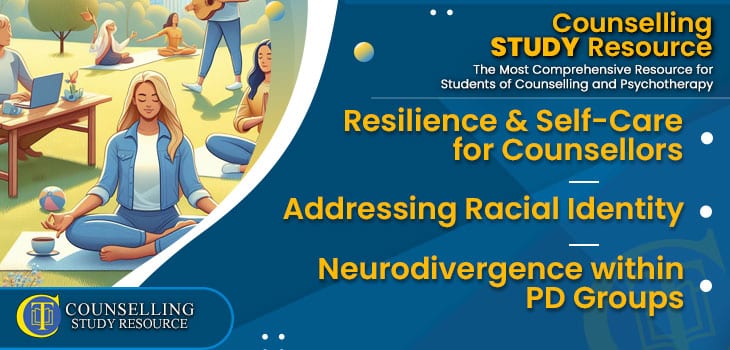298 – Self-Care for Counsellors
Addressing Racial Identity – Neurodivergence within PD Groups
In Episode 298 of the Counselling Tutor Podcast, your hosts Rory Lees-Oakes and Ken Kelly are back with this week’s three topics:
- Firstly in ‘Ethical, Sustainable Practice’, we look at resilience and self-care for counsellors and therapists.
- Then in ‘Practice Matters’, Rory speaks with Sarah Henry about the significance of addressing racial identity.
- And lastly in ‘Student Services’, Rory and Ken discuss neurodivergence within PD groups.
Resilience and Self-Care for Counsellors [starts at 02:00 mins]
This segment of the Counselling Tutor Podcast is sponsored by
WebHealer.net
- WebHealer are the go-to provider of websites for private practitioners in the UK.
- Established over 20 years, WebHealer offers a non-technical and fully supported service to help therapists grow their private practice.
- Just one customer from your website each year pays for their service.
Go to WebHealer.net and use coupon CT100 for £100 off their "Do it for me" service.
In order to look after your practice, you need to look after yourself. In this section, Rory and Ken discuss the importance of resilience and self-care for counsellors, and some of the ways you can practice this:
- Your counselling work should be bracketed, find things outside of work that you can focus on and enjoy.
- Be an active participant in your own well-being.
- Know yourself and your triggers – address things with your own personal therapy, and don’t be afraid to refer a client.
- Engage in a hobby or interest.
- Another self-care tip for counsellors and finding their own mindfulness.
- Engage in supervision and peer support – it can be a big help to share something that is worrying you or playing on your mind.
- We’re responsible to the client, not for the client – it’s about finding that balance.
- Review your supervision – are you getting the most out of it?
- Practising self-care as a counsellor also means creating your boundaries and keeping them.
- Take breaks when you need them.
- Sharpen your competencies with CPD – CPD is more than courses and certificates, it can be as simple as listening to a podcast such as this one.
Theory to Practice is sponsored by
Counselling Skills Academy
Learn counselling techniques by seeing counselling skills used in real sessions by qualified therapists.
Real sessions – real-life presentations – real skills.
Addressing Racial Identity [starts at 30:11 mins]
In this week’s ‘Practice Matters’, Rory speaks with Sarah Henry, a race trainer, about the significance of addressing racial identity.
The key points of this discussion include:
- The fear of offending somebody can't be avoided, but it can be worked through.
- It’s about building up the resilience and the courage to go through the fear and tolerate the experience of being vulnerable when having conversations about race and identity.
- Conversations about race don’t have to feel uncomfortable – questions that come from a place of respect and genuine curiosity open up conversations for mutual understanding.
- Sometimes there is a gap in your knowledge, not from malice, but from a lack of experience.
- Talking about race should be guilt free and free from fear – if you get something wrong, you can apologise and move forward with this gained knowledge.
Counselling Study Resource:
Assignment Guidance & Study Support for Counselling Students
- Academic Lecture Library - Lectures that cover key theory, skills and professional development linked to your counselling study.
- Assignment Guidance - Complete assignment exemplars and portfolios of work that have been passed by both tutors and awarding bodies.
- Theory Decoded, Skills Mastery and More - Counselling theories and skills are broken down into easy-to-understand ‘chunks’, with clear examples to guide you.
Neurodivergence within PD Groups [starts at 56:57 mins]
For some counselling students who are neurodiverse, personal development groups might be uncomfortable. In this section, Rory and Ken ponder how neurodivergence might present in PD groups – and whether something has to change:
- Sometimes, communication within personal development groups can feel especially difficult for those who are neurodivergent.
- It’s possible to sit in a PD group without saying a word, and still come out having had incredible process and breakthroughs – it is an internal process of personal development, individual to you.
- However, because of certain expectations that come with being in a PD group, we can feel pressured to speak and/or act in a certain way.
- Some people may feel they have to do what is expected of them, and that prevents you from meeting the real person.
- Could PD groups be adapted to understand a neurodivergent way of being?
Get on-demand Certified CPD that is implementable in your practice
Counsellor CPD Library
- Over 150 hours of on-demand CPD lectures to help you stay current with your CPD ethical requirements
- Support, and be supported, by thousands of other counsellors as a member of the exclusive online community.
- Access your learning anytime you want ... anywhere you choose ... using any device type — desktop or mobile.

Free Handout Download
Resilience and Self-Care in Practice
